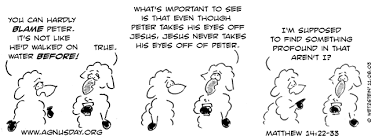Jesus’ Presence Changes Everything

This is the sermon I preached August 6 at St. Timothy Lutheran Church . The passage is Matthew 14:22-33. The Sea of Galilee is not a sea. It is a lake, often called Kinneret. It is larger than Chautauqua Lake, but not a lot. The word, translated ”sea,” could also be translated “Lake.” Given the storm we find the disciples in, it’s no wonder translators opted for “sea.” The sea was understood to be a living, chaotic, potentially deadly spirit (David Ewart, holytextures.com). And it was between 3 and 6 am when Jesus was walking toward the disciples. How would you feel? Don’t things always seem worse in the middle of the night? And in a storm? The disciples were frightened. Scripture says they were “terrified” when they saw Jesus walking in the storm on the sea. The word used here for “terrified” can also be used to describe a sea that has been agitated and stirred up. In other words, the disciples' inner state is now a perfect reflection of their outer circumstances (Ew...
